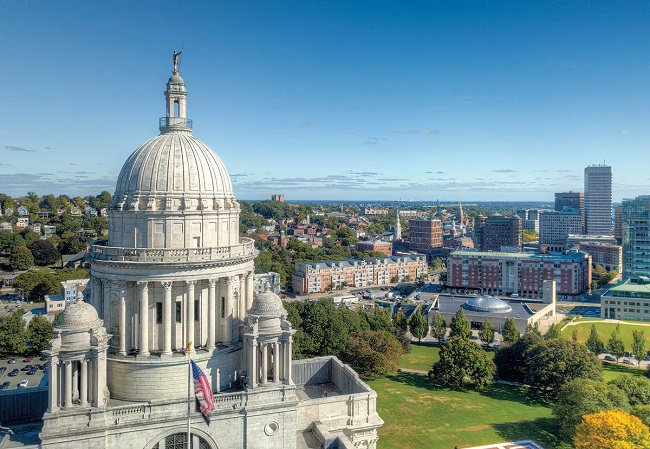
PROVIDENCE – House lawmakers on Thursday overwhelmingly passed a $13.6 billion state budget for next fiscal year that boosts spending for affordable housing, social services and a host of other programs and projects by tapping a surplus and a federal COVID-related windfall.
The 61-9 vote came after several hours of debate and a bevy of unsuccessful attempts to amend the budget, including eliminating the controversial state film tax credit program and creating a temporary gas tax holiday.
The House version of the fiscal 2023 tax-and spend plan marks a 6.3% increase over the $12.8 billion budget proposed by Gov. Daniel J. McKee earlier this year and a 3.8% bump over the $13.1 billion current fiscal year budget. It does not include any increases in state taxes or fees.
“This is one of the first times in a long time that the average person is going to feel something” in the budget, Rep. Marvin Abney, D-Newport, who chairs the House finance committee, told his colleagues in the chamber in urging their support.
The sweeping spending plan draws upon a nearly $900 million surplus as well as $431 million of the state’s American Rescue Plan Act funds to jump-start the economy while offering financial relief to struggling residents.
Gov. Daniel J. McKee and top state lawmakers have stressed – both separately and together – a strategy of using the extra funds for one-time “targeted” relief over new programs that may not be sustainable when the now-flush state coffers run dry.
To that end, the spending plan lays out an array of mostly temporary tax breaks, including those for income-eligible families with children, seniors and small businesses. One tax benefit with perhaps the widest impact is eliminating the state car tax, which if approved would end the unpopular tax for half a million vehicle owners a year ahead of schedule.
Meanwhile, a $250 million injection will pay for programs to support affordable housing and homeownership, a provision also included in McKee’s original budget. Lawmakers also maintained McKee’s proposal to use $108 million of the surplus money to build a new state-run hospital facility to replace the aging building on the Eleanor Slater Hospital’s Burrillville campus and supported Medicaid rate increases.
Also preserved from McKee’s budget is a $10 million boost to the state Motion Picture Tax Credit Program, raising the annual cap to $40 million to help lure eligible companies to film in Rhode Island, despite objections from some lawmakers who pointed to analysis by the R.I. Office of Revenue Analysis showing the state loses money on the incentive.
Two education proposals included in McKee’s plan, calling for municipal-run education centers and “Higher Education Academies”, were both nixed from the House version of the budget.
House lawmakers have also added several new programs and funding pots to their spending plan, including $100 million to backfill the state’s depleted unemployment insurance trust fund, $35 million to help develop a staging area for offshore wind turbines in East Providence’s South Quay, $28 million for the state historic tax credit program and $2.5 million to test out a program for free rides on the R.I. Public Transit Authority’s R-Line.
The House budget also doubled the borrowing proposal for infrastructure improvements at the University of Rhode Island’s Bay Campus from $50 million to $100 million. Lawmakers’ spending plan calls for a total of $400 million in new state bonds to help pay for secondary and higher education projects and environmental programs, which would go to voters in November.
Absent from the spending plan are any earmarks for the Tidewater Landing soccer stadium redevelopment in Pawtucket, which was since reworked its plan to fill new funding holes by shifting existing state dollars toward the stadium, with a plan to ask for another $20 million in new state bonds in the next legislative session.
The plan also does not offer any relief on gas or sales taxes, though McKee and legislative leaders said they may consider the latter in the next year.
Some lawmakers – mostly Republicans – unsuccessfully sought to add tax breaks that they said would help “the everyday American” compared with specific demographic groups, proposing amendments -which failed by overwhelming opposition – for a gas tax holiday and a sales tax exemption on electric bills, among others.
Despite the recently approved recreational marijuana law that allows retail pot shops to begin selling in December, the spending plan assumes minimal revenue -$6.6 million – from recreational marijuana in the upcoming budget year, since the program will be in its infancy.
The budget now heads to the Senate for consideration.
Nancy Lavin is a PBN staff writer. Contact her at Lavin@PBN.com.











